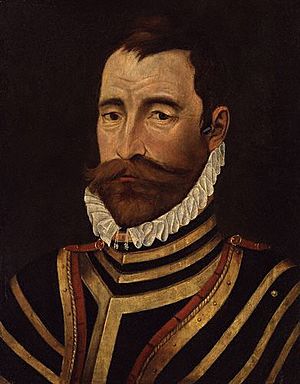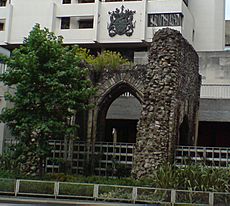William Drury facts for kids
Quick facts for kids
Sir William Drury
|
|
|---|---|

Sir William Drury
|
|
| Born | 2 October 1527 Hawstead, Suffolk
|
| Died | 13 October 1579 |
| Spouse(s) | Margaret Wentworth |
| Children | Jane Drury Anne Drury Elizabeth Drury |
| Parent(s) | Sir Robert Drury, Elizabeth Brudenell |
Sir William Drury (born October 2, 1527 – died October 13, 1579) was an important English leader and soldier. He served Queen Elizabeth I during a busy time in history.
Contents
Early Life and Education
William Drury was born in Hawstead, Suffolk, on October 2, 1527. He was the third son of Sir Robert Drury and Elizabeth Brudenell. His family was well-known.
He went to Gonville College at Cambridge University for his education. This prepared him for a life of public service.
A Career in Public Service
William Drury started his military career fighting in France in 1544. He was captured but later released. In 1549, he helped Lord Russell stop a rebellion in Devon.
He became more prominent during the reign of Queen Elizabeth I. In 1554, he was elected as a Member of Parliament for Chipping Wycombe.
In 1559, he was sent to Edinburgh to learn about Scottish politics. Five years later, he became a leader in Berwick-upon-Tweed, a town near the Scottish border.
Working in Scotland
Sir William Drury watched the events around Mary, Queen of Scots very closely. She was held in Lochleven Castle. He often wrote to Lord Burghley, a key advisor to Queen Elizabeth. On April 3, 1568, he wrote a detailed report about Mary's escape from the castle.
In January 1570, he traveled to Scotland and met with Regent Moray at Stirling Castle. Moray was later killed on his way to meet Drury again.
After this, Drury led two military trips into Scotland. He also went on peaceful missions, but his life was often in danger from people who wanted to harm him.
In April 1572, he worked as an ambassador with Thomas Randolph. They stayed at Restalrig Deanery. In May 1573, he commanded the English forces that made Edinburgh Castle surrender.
Time in Ireland
In 1576, Sir William Drury was sent to Ireland as the President of Munster. He was a strict but effective ruler there. In 1578, he became the Lord Justice of Ireland, taking charge after Sir Henry Sidney left.
During his time in Ireland, two Irish Catholic leaders, Bishop Patrick O'Hely and Friar Conn O'Rourke, were executed in Kilmallock in August 1579. This happened during a time of conflict.
Sir William Drury passed away in October 1579, just as the Second Desmond Rebellion was beginning.
Family and Personal Life
Sir William Drury married Margery Wentworth on October 10, 1560. They were married at St Alphage London Wall church. Margery was the daughter of Thomas Wentworth, 1st Baron Wentworth.
Sir William and Margery had three daughters:
- Jane Drury, who married Sir Richard Chetwood.
- Anne Drury, who married Robert Hartwell.
- Elizabeth Drury, born in 1573. Her godparents included Queen Elizabeth I and Robert Dudley, 1st Earl of Leicester. Elizabeth Drury later married William Cecil, 2nd Earl of Exeter.
His Lasting Impact
Sir William Drury's letters to Lord Cecil and others are very important. They help us understand the relationship between England and Scotland during his time.
His house in London later gave its name to the famous Drury Lane.
Years after his death, in September 1992, Bishop Patrick O'Hely and Friar Conn O'Rourke were honored by Pope John Paul II. They were recognized for their faith.
 | Claudette Colvin |
 | Myrlie Evers-Williams |
 | Alberta Odell Jones |


